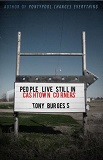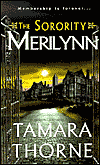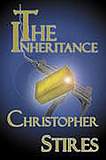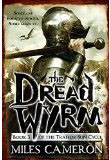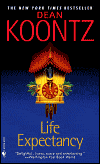
Life Expectancy, by Dean Koontz
Book Review by James Michael White
Have you read this book?
Dean Koontz entertains about life and its meaning as seen through the eyes of a pastry chef caught up in ten predictions made by his dying grandfather on the day he was born. Sounds like a badly written sentence, doesn't it? Let me explain: the day Jimmy Tock is born, his grandfather makes ten predictions, five of which are terrible and life-shaping ones. That he makes these predictions while a furious storm rages outside the hospital in which life and death find themselves neighbors only adds to the atmosphere in what is the most powerfully atmospheric moment in a story full of zip-zip plot and Tracy-Hepburn-esque patter, the latter cutesy enough in places to tilt into the sitcom realm of the really annoying and possibly fatal: here's why...
Jimmy Tock's life is haunted by clowns. Not your usual BS scary clowns that exist in fiction in such numbers as to make you roll your eyes and groan about, ah, heck, more frikkin clowns, but professional clowns with personality behind the makeup -- dark, twisted, mad kinds of personality. It's the unmasking of the monster, up front and declaratively so, that, along with grandpop's predictions, propels the story along its episodic and keenly plot-pointed path. You see, it's the first mad clown, the great Konrad Beezo -- chain-smoking in a hospital waiting room alongside Jimmy's father -- that captures our attention and makes us want to find out what he means when he tells him, "I'll never forget you, Rudy Tock. Never."
Here's why: That clown, Konrad Beezo, is convincingly nuts, and during this wait the chain-smoking clown pacing up and down hospital linoleum convinces us in the ruddy glow of a cigarette and storm-dimmed lights that he's not just some clown, not just some circus-act performer, but an elemental force sprung from the dark places of the earth, one with a serious grudge against a fellow family of circus performers who happen to be trapeze artists of the name Vivacemente. For this reason, and a few murderous other ones, we're convinced when he says that he's indebted to the father. We're also convinced that he, and that debt, will play some kind of role in the terrible five days predicted by the dying elder Tock.
They do. But not in expected ways. A grown-up Jimmy finds himself years later caught in the midst of bank robbery, handcuffed to a beautiful woman, both of them hostage to a charming madman his own age, and it's during moments like this that the snappy dialogue, entertaining though it is, also seems very likely the kind of lip that might get one killed if the bank robber doesn't like the sass.
But Koontz isn't writing in realist mode, here. He's gunning all cylinders in the entertainment mobile, and this thing races with all the hop-skip-and-jump of Jimmy Tock's adored Dodge Daytona Shelby Z, keeping reliably on the road of those predictions and their consequences, even managing to eventually connect to the family of trapeze artists whom Konrad Beezo despises so much and who, in their own Shylockian ways, demand their pound of flesh in this tale in which predestiny, and the payment of debts, casts a long shadow.
This is central to the novel, by the way, notions of predestiny and what one should be in life, and how one should get there, and how one should live that life. Oh, it's not central in a heavy and deeply involved way, but it's there just like the creamy filling inside a Twinkie -- a little something extra for flavor, and to add context to what, in the end, is a story about a guy trying to live life the best way he knows how, despite its ups and downs. Kind of like all the rest of us.
And, just like a Twinkie, Dean Koontz's Life Expectancy makes for a tasty literary tidbit. Readers looking for literary confections will certainly find one here.
Jimmy Tock's life is haunted by clowns. Not your usual BS scary clowns that exist in fiction in such numbers as to make you roll your eyes and groan about, ah, heck, more frikkin clowns, but professional clowns with personality behind the makeup -- dark, twisted, mad kinds of personality. It's the unmasking of the monster, up front and declaratively so, that, along with grandpop's predictions, propels the story along its episodic and keenly plot-pointed path. You see, it's the first mad clown, the great Konrad Beezo -- chain-smoking in a hospital waiting room alongside Jimmy's father -- that captures our attention and makes us want to find out what he means when he tells him, "I'll never forget you, Rudy Tock. Never."
Here's why: That clown, Konrad Beezo, is convincingly nuts, and during this wait the chain-smoking clown pacing up and down hospital linoleum convinces us in the ruddy glow of a cigarette and storm-dimmed lights that he's not just some clown, not just some circus-act performer, but an elemental force sprung from the dark places of the earth, one with a serious grudge against a fellow family of circus performers who happen to be trapeze artists of the name Vivacemente. For this reason, and a few murderous other ones, we're convinced when he says that he's indebted to the father. We're also convinced that he, and that debt, will play some kind of role in the terrible five days predicted by the dying elder Tock.
They do. But not in expected ways. A grown-up Jimmy finds himself years later caught in the midst of bank robbery, handcuffed to a beautiful woman, both of them hostage to a charming madman his own age, and it's during moments like this that the snappy dialogue, entertaining though it is, also seems very likely the kind of lip that might get one killed if the bank robber doesn't like the sass.
But Koontz isn't writing in realist mode, here. He's gunning all cylinders in the entertainment mobile, and this thing races with all the hop-skip-and-jump of Jimmy Tock's adored Dodge Daytona Shelby Z, keeping reliably on the road of those predictions and their consequences, even managing to eventually connect to the family of trapeze artists whom Konrad Beezo despises so much and who, in their own Shylockian ways, demand their pound of flesh in this tale in which predestiny, and the payment of debts, casts a long shadow.
This is central to the novel, by the way, notions of predestiny and what one should be in life, and how one should get there, and how one should live that life. Oh, it's not central in a heavy and deeply involved way, but it's there just like the creamy filling inside a Twinkie -- a little something extra for flavor, and to add context to what, in the end, is a story about a guy trying to live life the best way he knows how, despite its ups and downs. Kind of like all the rest of us.
And, just like a Twinkie, Dean Koontz's Life Expectancy makes for a tasty literary tidbit. Readers looking for literary confections will certainly find one here.
|
Click here to buy Life Expectancy, by Dean Koontz on Amazon
|
Life Expectancy, by Dean Koontz on Amazon

| More Books You Might Like |
Comment on Life Expectancy, by Dean Koontz
